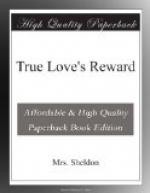“On the same day he gave me a small mirror that had once belonged to Marie Antoinette, and which, he said, had been handed down as an heirloom in my mother’s family for several generations. This mirror he cautioned me never to part with; and so, when I went South with you, I packed it with my other things in my trunk. That last evening in New Orleans, while removing and repacking some clothing I dropped the book containing my mirror. When I picked it up I discovered that it contained a secret drawer in its frame. In the drawer there were some letters, a box containing two rings belonging to my mother and a full confession, written by my father upon the very day that he had presented me with the royal keepsake.
“So,” Mona concluded, “you perceive that even had you destroyed the certificate proving their marriage, I should have other and sufficient proof that I was the child of Mr. and Mrs. Walter Dinsmore.”
“Oh! if I had only forced the sale of all his property and gone back at once to California, I should have escaped all this and kept my fortune,” groaned the unhappy woman, in deep distress.
“Really, Mrs. Dinsmore, you are showing anything but a right spirit—” Mr. Corbin began, in a tone of reproof, when she interrupted him with passionate vehemence.
“Never address me by that name,” she cried. “Do you suppose I wish to be known as the widow of the man who repudiated me? Never! That was why I adopted the name of Montague, and I still wish to be known as such. Ah!—but if I have to go to—Oh, pray plead for me!” she cried, turning again to Mona; “do not let them send me to prison.”
Just at that moment Mr. Palmer’s wan face appeared again at the rear door of the drawing-room.
He beckoned to Ray, who immediately left the room, and Mona, who had grown very thoughtful after Mrs. Montague’s last appeal, left her seat and approached the lawyers.
“Mr. Graves—Mr. Corbin,” she said, in a low tone, which only they could hear, “cannot something be done to keep this matter from becoming public? I cannot bear the thought of having my dear father’s name become the subject of any scandal in connection with this woman. It would wound me very sorely to have it known that Mrs. Richmond Montague, who has figured so conspicuously in New York society, was his discarded wife; that she robbed me of my fortune, and why; that she—the woman bearing his name—was the unprincipled schemer who defrauded Mr. Justin Cutler and Mrs. Vanderheck, and robbed Mr. Palmer of valuable diamonds. I could not endure,” she went on, flushing crimson, “that my name should be brought before the public in connection with Louis Hamblin and that wretched voyage from New Orleans to Havana.”
“But, my dear Miss Dinsmore—” began Mr. Corbin.




